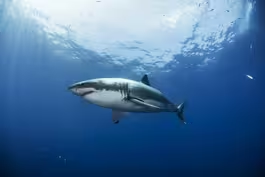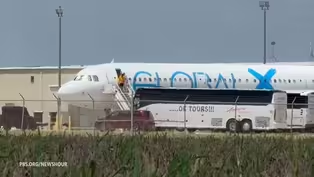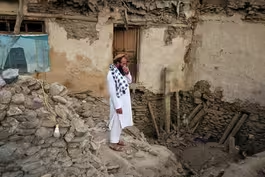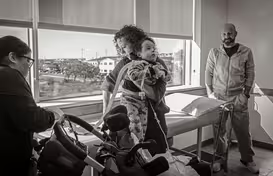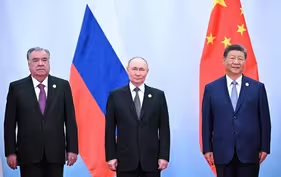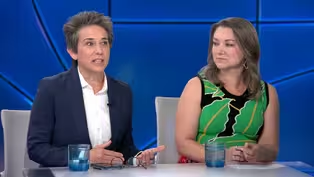
Photojournalist documents arrests at immigration hearings
Clip: 9/1/2025 | 4m 45sVideo has Closed Captions
Photojournalist documents arrests outside of immigration hearings
As part of President Trump's deportation push, officials have conducted arrests outside courtrooms as people show up for hearings with immigration judges. The detentions have led to sometimes dramatic scenes with families pleading to let loved ones go. Geoff Bennett spoke with Victor Blue, a photojournalist who spent weeks documenting arrests at federal facilities in Manhattan.
Problems playing video? | Closed Captioning Feedback
Problems playing video? | Closed Captioning Feedback
Major corporate funding for the PBS News Hour is provided by BDO, BNSF, Consumer Cellular, American Cruise Lines, and Raymond James. Funding for the PBS NewsHour Weekend is provided by...

Photojournalist documents arrests at immigration hearings
Clip: 9/1/2025 | 4m 45sVideo has Closed Captions
As part of President Trump's deportation push, officials have conducted arrests outside courtrooms as people show up for hearings with immigration judges. The detentions have led to sometimes dramatic scenes with families pleading to let loved ones go. Geoff Bennett spoke with Victor Blue, a photojournalist who spent weeks documenting arrests at federal facilities in Manhattan.
Problems playing video? | Closed Captioning Feedback
How to Watch PBS News Hour
PBS News Hour is available to stream on pbs.org and the free PBS App, available on iPhone, Apple TV, Android TV, Android smartphones, Amazon Fire TV, Amazon Fire Tablet, Roku, Samsung Smart TV, and Vizio.
Providing Support for PBS.org
Learn Moreabout PBS online sponsorshipGEOFF BENNETT: As another part of the Trump administration's mass deportation push, immigration enforcement officials have conducted arrests outside courtrooms as people show up for hearings with immigration judges.
The detentions have led to sometimes dramatic scenes, with families pleading to let their loved ones go and confrontations with officers.
We spoke to one photojournalist who spent weeks documenting arrests at federal facilities in Manhattan.
VICTOR BLUE, Freelance Photojournalist: Folks who immigrate here to the United States from their home countries believe deeply in the promise of this country, a promise of America.
And to watch their faith in that promise kind of suddenly whisked away from them as they're carted off to detention is one of the most surprising and one of kind of the most bracing things to witness.
My name is Victor Blue.
I'm a freelance photojournalist.
And I'm based in Brooklyn, New York.
I have been working on immigration coverage pretty much since I kind of started my career over two decades ago.
I got my start in Central America.
I was able to kind of gain a real understanding of the context and the communities and the dynamics that people were leaving to emigrate to the United States.
DONALD TRUMP, President of the United States: We will begin the largest deportation operation in the history of the United States.
VICTOR BLUE: It became obvious pretty quickly this new administration was going to have a quite a different posture towards immigration enforcement.
I spent the better part of July and little over the first week of August attending court every day.
Early in the morning, there's a long line of immigrants who arrive for their court appointments.
The agents are waiting outside.
The agents usually are carrying a kind of sheaf of papers.
They include a photograph of their target, the person that they're looking for.
When the immigrants leave the courtroom, if they're on that list of targets, they kind of quietly ask them to come with them, maybe take them by the elbow and kind of lead them, maybe not.
Oftentimes, they don't even need to.
The immigrants just go with them into the area, the bank of elevators or a stairwell, and then kind of head down to the 10th floor detention center.
That was the thing that was most surprising to me.
Of course, we have seen footage of kind of aggressive, violent, kind of tense detentions, but the vast majority of them are kind of deceptively quiet.
They haven't really realized yet that whatever decision the judge has made really doesn't matter at that point, that the agents have their marching orders and that they are going to be detained.
I remember watching that young woman enter the court.
When she walked out and was initially stopped by the agents, her face just fell and she immediately began to cry before they were able to completely slam the door of the stairwell.
I was positioned to make a picture, and she kind of looked back at me.
I think that her expression there, the fear and the kind of realization that the journey she'd been on had in large part come to a close was dawning on her.
For much of the time that I was going into the courts, there was a real reluctance on the part of the agents to detain parents of young children.
That's definitely changed over the course of my time in there.
And now it's not uncommon at all to see the detention of parents of young children, to see the family separated right there in the hallways.
And, of course, that's an unbelievably wrenching experience for the families, right, to have their family pulled apart right there in front of everyone.
My goal as a photojournalist, I'm not there to demonize or to celebrate anybody in this dynamic.
I'm there to further understanding.
We know that it affects the agents.
They tell us that it affects them.
Many of them tell us they don't like what they're doing.
We have had some tell us it's the worst job they have ever had.
It almost feels kind of like a historical anomaly to have a front-row seat to it, to be able to go in day after day after day with this kind of unprecedented immigration enforcement.
And I think that in the end is really going to be the value of our coverage, right, that we didn't just show up for the most sensational kind of moments that were there day in and day out, to kind of show folks the volume of what's happening.
And even if an arrest is quiet and isn't particularly sensational and isn't a particularly impactful photograph, every one of those arrests represents a real crisis for a family, a real crisis for an individual immigrant, a real break in their journey towards hopefully a better life and their journey towards joining the society that they have fought so hard to be a part of.
50 years after 'Jaws,' researcher dispels myths about sharks
Video has Closed Captions
Clip: 9/1/2025 | 6m 42s | 50 years after 'Jaws,' researcher dispels myths about sharks (6m 42s)
Court blocks deportation flights of unaccompanied minors
Video has Closed Captions
Clip: 9/1/2025 | 6m 31s | Court blocks deportation flights of unaccompanied minors to Guatemala (6m 31s)
David Duchovny on poetry influenced by his life and career
Video has Closed Captions
Clip: 9/1/2025 | 6m 56s | David Duchovny on his new book of poetry influenced by his life and career (6m 56s)
Devastating earthquake strikes Afghanistan, deepening crisis
Video has Closed Captions
Clip: 9/1/2025 | 3m 59s | Devastating earthquake strikes Afghanistan, deepening humanitarian crisis (3m 59s)
Medical advancements could reshape outlook for Trisomy 18
Video has Closed Captions
Clip: 9/1/2025 | 8m 20s | How medical advancements could reshape the outlook for children with Trisomy 18 (8m 20s)
News Wrap: China welcomes allies to annual security summit
Video has Closed Captions
Clip: 9/1/2025 | 6m 16s | News Wrap: China welcomes closest allies to annual security summit (6m 16s)
Tamara Keith and Amy Walter on Trump's Chicago threats
Video has Closed Captions
Clip: 9/1/2025 | 8m 50s | Tamara Keith and Amy Walter on Trump's threats of a Chicago takeover (8m 50s)
Providing Support for PBS.org
Learn Moreabout PBS online sponsorshipSupport for PBS provided by:
Major corporate funding for the PBS News Hour is provided by BDO, BNSF, Consumer Cellular, American Cruise Lines, and Raymond James. Funding for the PBS NewsHour Weekend is provided by...
